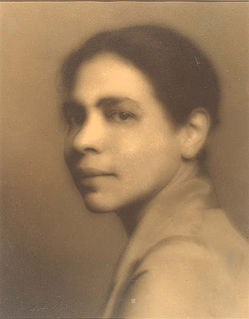A Quote by George Eliot
Surely there was something taught her by this experience of great need; and she must be learning a secret of human tenderness and long-suffering, that the less erring could hardly know?
Related Quotes
You must learn her. You must know the reason why she is silent. You must trace her weakest spots. You must write to her. You must remind her that you are there. You must know how long it takes for her to give up. You must be there to hold her when she is about to. You must love her because many have tried and failed. And she wants to know that she is worthy to be loved, that she is worthy to be kept. And, this is how you keep her.
To see helpless infancy stretching out her hands, and pouring out her cries in testimony of dependence, without any powers to alarm jealousy, or any guilt to alienate affection, must surely awaken tenderness in every human mind; and tenderness once excited will be hourly increased by the natural contagion of felicity, by the repercussion of communicated pleasure, by the consciousness of dignity of benefaction.
The purposes of the Almighty are perfect, and must prevail, though we erring mortals may fail to accurately perceive them in advance. We hoped for a happy termination of this terrible war long before this; but God knows best, and has ruled otherwise. We shall yet acknowledge His wisdom, and our own error therein. Meanwhile we must work earnestly in the best lights He gives us, trusting that so working still conduces to the great ends He ordains. Surely He intends some great good to follow this mighty convulsion, which no mortal could make, and no mortal could stay.
Some attribute had departed from her, the permanence of which had been essential to keep her a woman. Such is frequently the fate, and such the stern development, of the feminine character and person, when the woman has encountered, and lived through, an experience of peculiar severity. If she be all tenderness, she will die. If she survive, the tenderness will either be crushed out of her, or—and the outward semblance is the same—crushed so deeply into her heart that it can never show itself more.
I looked and looked at her, and I knew, as clearly as I know that I will die, that I loved her more than anything I had ever seen or imagined on earth. She was only the dead-leaf echo of the nymphet from long ago - but I loved her, this Lolita, pale and polluted and big with another man's child. She could fade and wither - I didn't care. I would still go mad with tenderness at the mere sight of her face.
Bedding her could be anything from tenderness to riot, but to take her when she was a bit the worse for drink was always a particular delight. Intoxicated, she took less care for him than usual; abandoned and oblivious to all but her own pleasure, she would rake him, bite him - and beg him to serve her so, as well. He loved the feeling of power in it, the tantalizing choice between joining her at once in animal lust, or of holding himself-for a time- in check, so as to drive her at his whim.
The world taught women nothing skillful and then said her work was valueless. It permitted her no opinions and said she did not know how to think. It forbade her to speak in public and said the sex had no orators. It denied her the schools, and said the sex had no genius. It robbed her of every vestige of responsibility, and then called her weak. It taught her that every pleasure must come as a favor from men and when, to gain it, she decked herself in paint and fine feathers, as she had been taught to do, it called her vain.
Was not Hypatia the greatest philosopher of Alexandria, and a true martyr to the old values of learning? She was torn to pieces by a mob of incensed Christians not because she was a woman, but because her learning was so profound, her skills at dialectic so extensive that she reduced all who queried her to embarrassed silence. They could not argue with her, so they murdered her.
I'm looking for a writer who doesn't know where the sentence is leading her; a writer who starts with her obsessions and whose heart is bursting with love, a writer sly enough to give the slip to her secret police, the ones who know her so well, the ones with the power to accuse and condemn in the blink of an eye. It's all right that she doesn't know what she's thinking until she writes it, as if the words already exist somewhere and draw her to them. She may not know how she got there, but she knows when she's arrived.
She regretted having taken his hand, she wanted to get away from there as soon as possible, to hide her shame, never again to see that man who had witnessed all that was most sordid in her, and who nevertheless continued to treat her with such tenderness. But again she remembered Mari's words: She didn't need to explain her life to anyone, not even to the young man standing before her.
Even after the age of 50 it was impossible for me to see my mother as a human being. I felt she was a monster, and she had subtly been influencing my behavior and my thoughts and my dreams for so long that she was kind of a monster; she was a demon. And when I brought her back to life, I could feel that malevolent presence around me again, that woman who was totally incapable of giving nurturing to anybody, and, you know, her selfishness and her withdrawn indifference to everything but her own needs.
As a woman, she [Penelope Cruz] obviously has changed as she has become an adult. But, as an actress, I actually might say that she has not changed that much. And she has something great, especially in comedy, and she hasn't been exploited as much as she could be in comedy, but particularly in that mix between comedy and drama. She's got a very special quality about her. You can place her in very extreme situations, especially very painful situations, in terms of how her character interprets it. And sometimes, the deeper and more human that pain is, the better she is at it.
Somewhere, within her, in a deep recess, crouched discontent. She began to lose confidence in the fullness of her life, the glow began to fade from her conception of it. As the days multiplied, her need of something, something vaguely familiar, but which she could not put a name to and hold for definite examination, became almost intolerable. She went through moments of overwhelming anguish. She felt shut in, trapped.






































